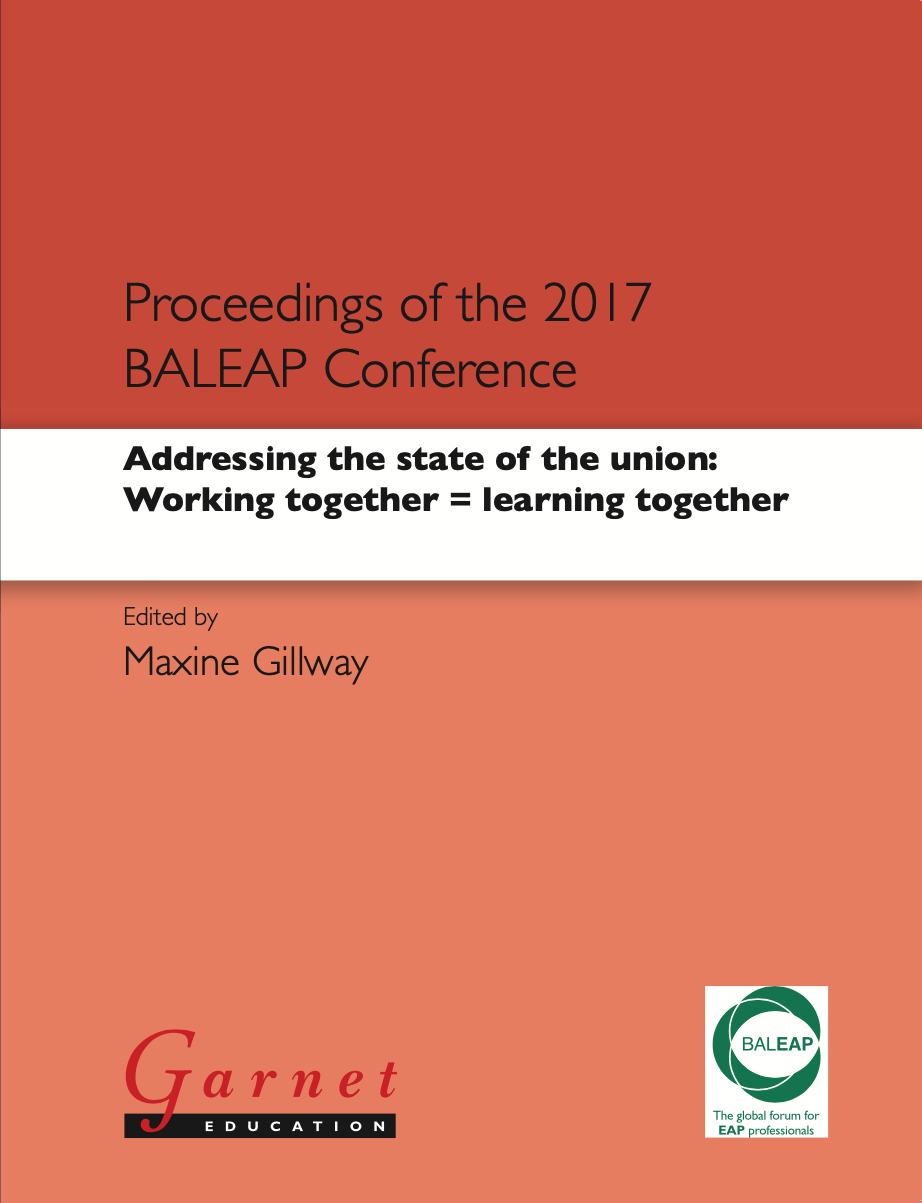About the book
BALEAP, the global forum for EAP professionals, supports the professional development of those involved in learning, teaching, scholarship and research in English for Academic Purposes (EAP). This volume contains a selection of papers on the theme of collaboration from the Biennial BALEAP Conference held at University of Bristol, UK, in April 2017. The range and diversity of the collaborations documented within bear testament to the complex role of the EAP professional. Whether you missed the conference or wish to recall some of the presentations you attended, this is a volume you should read.
Please click here to read the introduction.
Contents
Introduction – Maxine Gillway
Opening plenary: State of the union: What union? – Clare Furneaux
Closing plenary: Cultivating language assessment literacy as collaborative CPD – Glenn Fulcher
Section I: Collaboration between institutions
Emancipating ourselves from mental slavery: Affording knowledge in our practice – Susie Cowley-Haselden and Laetitia Monbec
‘At your service’? Can collaboration between UK EAP and subject teachers obviate Raimes’ so-called ‘butler stance’? – Jonathan Smart
Management roles in EAP teaching: Creating an EAP management network – Sarah Brewer and Elisabeth Wilding
Routes, realities and rewards: A collaborative exploration of EAP teacher observation and development – Mary Forbes, Sarah Butler and Conrad Heyns
Professional and personal learning curves in cross-cultural collaborations – Sofia Di Giallonardo
Section II: Collaboration between areas of expertise
Moving towards ‘real’ collaboration in designing an online large-scale ESAP course – France Barth, Helen McKenna and David Donnarumma
Corpus from scratch: Collecting and processing a sizeable EAP corpus in a (relatively) resource-poor context – Priya Mathew, Hilary Nesi and Benet Vincent
Putting the S into EGAP – Nathalie Vermeire and Tom Rewhorn
Collaboration matters: Meeting the needs of context-sensitive ESAP teaching – Petra Kletzenbauer and Alia Moser
Developing academic literacy: A team-teaching approach between the School of Health and Human Sciences and the Talent Development Centre – Caroline Hawthorne and Camille Cronin
The effectiveness of collaboration between a class teacher and a teacher assistant as a subject expert on a pre-sessional course – Sue Teale
Value creation in a partnership academic literacy programme – Simon Webster
What would the subject specialist say? A comparison of perceptions of L2 writing – Els Van Geyte and Anke Büttner
EAP and subject-specialist academic writing feedback collaboration – David Caulton, Jill Northcott and Pauline Gillies
Multi-layered collaboration: Reflecting on the challenges of creating a university-based online EAP skills assessment – Michel Mason
Section III: Collaboration between staff and students
Academic skills for MA: Developing a student-driven, subject-specific, EAP support programme for PG students – Zoe Gazeley-Eke
Listening in lectures: Are pre-sessional students transferring the skills and strategies from pre-sessional courses to PG lectures? – Christine Lee
Student progress in academic literacy on a pre-sessional programme at an Irish university – Anna Nunan and Alex Runchman
International students as curriculum advisers for academic writing courses: Developing and implementing staff–student partnerships – Terri Edwards and Tamara Barakat
Collaborating with postgraduates on providing 1:1 academic support: Who benefits and how? – Anne Kavanagh
Breaking down barriers: Increasing student engagement in feedback through collaboration – Carla Grimley
Section IV: Collaboration between students
Improving pronunciation awareness and accuracy through collaborative learning – Rina F. De Vries and Veronica Raffin
An investigation into the student learning experience of a collaborative research and seminar assessment task on a pre-sessional EAP course – Ruth Humphreys, Jane Richardson and John-Sebastian Schutter
Taking EAP students to another dimension … pay close attention: A collaborative online international learning project – Andrew Preshous, An Ostyn and Nicole Keng



